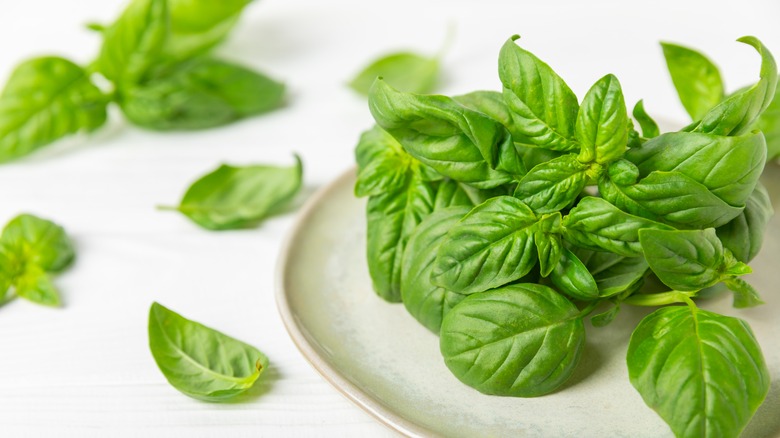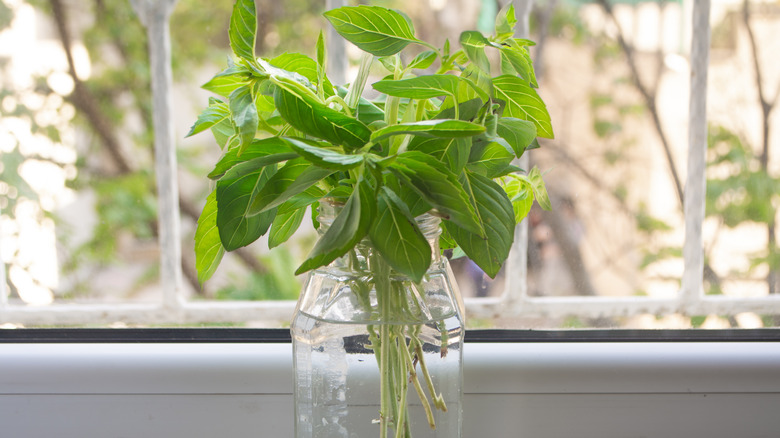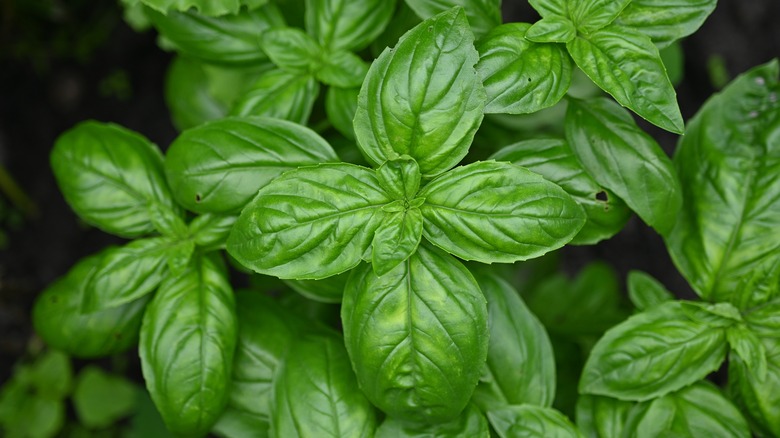Are You Able To Store Basil At Room Temperature Or Should It Go In The Fridge?
If you could only have one fresh herb in your kitchen, let it be basil. Vital to a range of cuisines from Italian to Indonesian, cooking with basil lends sweet and savory notes to all kinds of dishes. Besides being the star ingredient in pesto and a staple garnish for pasta, it's as wonderful in a crispy Thai basil beef stir-fry as it is in a Caprese salad. Cooking aside, basil can also be a valuable addition to a mixologist's arsenal. Substitute it for mint, its similarly fragrant sibling, in a mojito or use it to brighten up a pitcher of lemonade. Even if you lovingly care for a basil plant at home to harvest its leaves on demand, chances are you could keep finding new recipes for it before ever running out.
However, in spite of all the ways it might end up being handled, whether chopped, muddled, or smashed with spices, basil is a fragile ingredient. The herb should be handled with care to preserve its vibrant color and flavor, especially in terms of storage. If basil is left in the wrong place for more than a couple of days, it'll probably end up in the compost bin instead of a steaming pot of soup. Unlike some herbs that naturally thrive in cooler environments — say, cilantro — basil doesn't do well in cold conditions, so you'll want to keep it out of the fridge. Instead, store basil at room temperature to keep the fragrant herb fresh for longer.
The best way to store basil
When storing a bunch of fresh basil stems, the standard advice is to treat the herb as you would a bouquet of flowers. If stemmed, the ends should be trimmed slightly then put in a glass jar with some water. Ideally, you want the container to be just full enough so that the stalks can easily drink, but not so full that the leaves get wet. Otherwise, you might lose a few precious pieces to spoilage. To keep the herb fresh for as long as possible, loosely place a plastic bag over the basil. When left at room temperature and out of direct sunlight, basil should last for about a week or two. Note that, as with flowers, it's important to change the water every couple of days to prevent bacterial growth.
If you're storing loose basil that has been removed from the plant's stalks, the procedure is fairly similar. Since the leaves aren't conveniently able to satisfy their thirst, there's no need to grab a glass of water. Instead, simply skip to putting them in a plastic bag, gently wrapping it closed to avoid bruising the herb, which can speed up discoloration and wilting. You won't want to tie the bag shut before leaving it on the counter, as a little breathing room will help release any moisture that may build up. By following these steps, your basil should hopefully stay fresh until you're ready to use it.
Why basil doesn't last long in the fridge
When basil is left in the fridge, you'll notice that its delicate leaves take a dramatic turn for the worse. The herb's leaves start to wilt until the whole bunch has more or less collapsed and their bright green hue fades to black — as good a sign as any that your basil is no longer fresh for eating. However, the speed at which basil deteriorates might leave you wondering why this herb in particular shouldn't go be refrigerated. After all, plenty of other ones, including mint, last longest when you keep them cold.
To better understand why basil doesn't do well in the fridge, you can look to the plant's roots. Specifically, consider the conditions that it normally thrives in. True to many of the cuisines its commonly part of, basil is native to Asia and grows in many subtropical and tropical regions of the world. While the plant isn't immune to the perils of harsh sunlight, as it can end up sunburned, it generally prefers warm weather. Basil grows best at temperatures between 70 and 85 degrees Fahrenheit, which align more closely with the air in the kitchen than the fridge. In contrast, herbs like parsley or dill that should be stored in the fridge tend to be hardier plants that can grow in cool or even extremely cold conditions. For basil and plenty of other produce, becoming familiar with how they grow could end up aiding your cooking.


